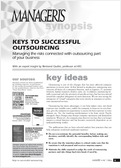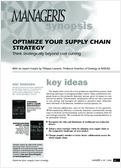Supplier or partner?

Establishing partnerships with your strategic suppliers can be a source of decisive strategic advantage.
The remarkable performance of Toyota can be largely explained by the way the company organizes production. Rather than manufacturing components in house, or buying them from the lowest-priced supplier, Toyota chose to work in long-term relationships with a network of preferred suppliers. And Chrysler made a spectacular recovery after adopting this model in the early nineties.
Collaborative Advantage learns lessons from these two examples, and makes conclusions that could benefit companies in any industry.
There are many benefits to working in partnership with suppliers:
– Better cost control.
– Improved quality.
– Reduced time required to develop new products.
This organizational model is suitable for complex products.
– When a product is composed of complex components, it is better to outsource manufacturing to specialized companies.
– However, if these components are interdependent, efficient coordination is crucial. An effective way to facilitate coordination is to build an “extended company” with a limited number of suppliers.
Three factors are key to the success of the extended company:
– Create a climate of trust.
– Organize transfer of knowledge.
– Convince suppliers to invest in assets dedicated to the partnership.
SubscriberSign in
to download
the synopse (8 p.)
VisitorI want to buy
this synopsis (8 p.)
VisitorI want
to subscribe
See also

Keys to successful outsourcing
The extended company is an organizational model with many advantages, but also definite risks. How to outsource some of your business functions safely?


